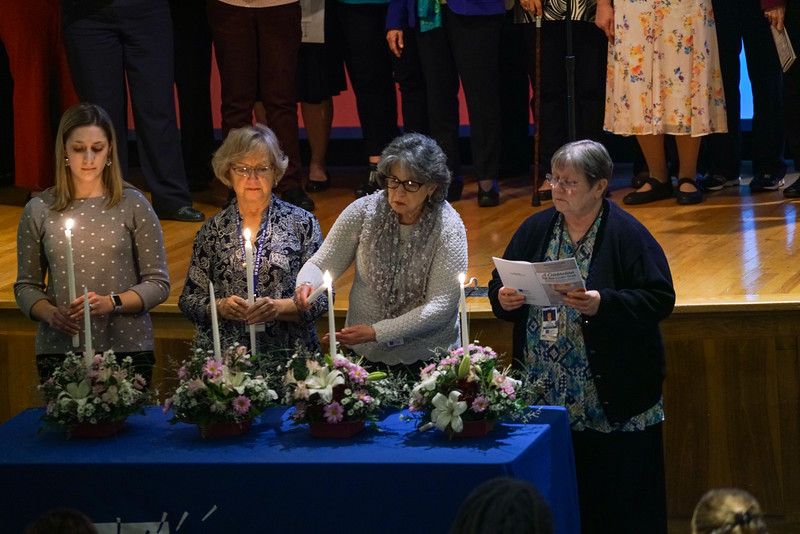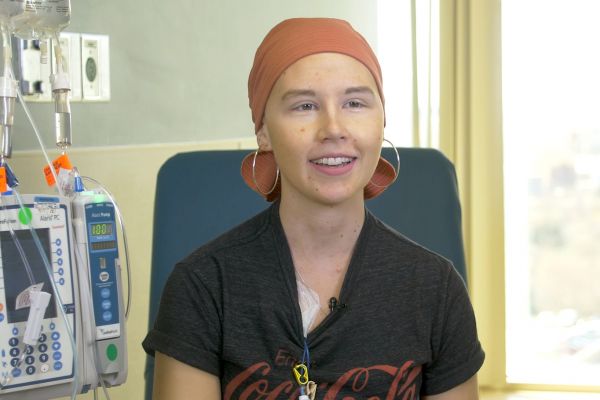Roswell Park's End of Life and Bereavement program provides compassionate support for patients who have received a terminal diagnosis, as well as their families. Generous donations have supported the initiative since its founding in 2002. Since then, the program has reached out to over 17,000 patients and their families. Beth Lenegan, PhD, Director of Spiritual Care, tells us about her first-hand experience with this program.
What does the End of Life and Bereavement program provide to patients and their families?
A: When a patient receives a terminal prognosis of six months or less, our staff contacts the patient and explains what our program does, and that we would like to help during this difficult time. If they are interested in the service, a staff member keeps in touch with the patient and their family and offers them support from Roswell Park and spiritual care. We visit patients while they are inpatients, and we continue to follow up with them after they are discharged. When the patient passes away, we give whatever support is needed. We may go to the wake or hold the funeral service, and we stay in touch with the family for one year and offer our bereavement services to the family.
What bereavement services are available for families when their loved one passes away?
A: We hold monthly grief support meetings for families, and invite them to attend Rivers of Healing — a weekend grief retreat that's held every May in Chautauqua, NY. The weekend allows families to connect with others who are trying to cope and begin a new life after the death of a loved one. Roswell Park's End of Life and Bereavement program also sponsors four different patient remembrance services that offer a way for family members to celebrate their loved ones' lives — including services specifically for pediatric patients and employees. From care notes to phone calls to holiday cards, we stay connected with the families to offer support and help when we can. Donated funds have also helped us create our own grief resource book that is mailed out to all of the families that we are helping. We also have a grief holiday book that is sent to those who have lost a loved one, because we know it is a difficult time of year for them.
Roswell Park's Spiritual Care Department
Learn about the other services offered by Spiritual Care.
Learn MoreHow does this program help patients and their families?
A: Each patient gets something different out of this program. Some are trying to figure out why this is happening to them; others may have questions about the afterlife — and they might need someone to talk to about those thoughts.
The patients are often worried about their families' grief, and the families are concerned about what they are going to do without their loved ones. We can play a supportive role with those concerns. The bereavement aspect of the program reminds families that we have not forgotten them or their loved one. It allows us to say, 'we are here to continue our support of you.' The remembrance services and grief program are a comfort to them, and the support groups allow families to meet others who are going through a loss as well. There is a common bond there.
How are donations helping the program grow?
A: With the generous support of the Alliance Foundation, we will be starting a new Mercy Doula program within the End of Life and Bereavement program. This past March, we had the first of three training sessions for staff members to become a doula.
A doula is a trained volunteer or staff member who companions the dying. The presence of a doula makes a significant difference to the seriously ill persons who have limited networks of family and friends. The Doula Program also offers a respite for families who sit at the bedside of their loved one. The Doula Program is deeply sensitive in the art of listening and discerning the spiritual and social need of the one he/she companions. We hope to have the Doula Program begin in January 2020.
Why is this program so important?
A: Death touches us all, and we all have experienced other people reaching out to us when we have lost a loved one. If we think about our own experiences — when we have been supported during a difficult time — we can understand how important this program is for our patients and their families.


